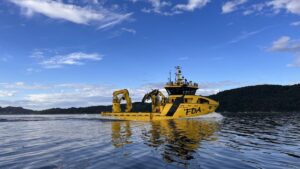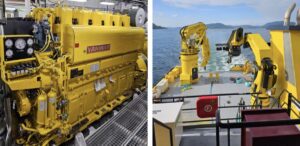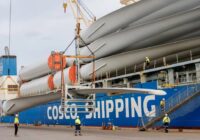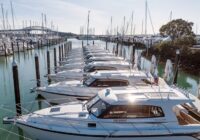After a lightning-fast eleven-month build, the Mimmi went into service last September in the Norwegian waters south of Nordland. Designed and built by Fitjar, for operator Finnsnes Dykk & Anleggservice AS, she’s named after the owner’s daughter’s nickname. She’s a working boat, made to perform a variety of tasks, including pipelaying, placing sea cables and anchoring for fish farms.

Propulsion comes courtesy of a 1,340kW Yanmar 6EY22AWS fitted with a selective catalytic reduction system. She’s a hybrid, with a two-step Finnøy output gear with 1,000kW PTI/PTO. There is also a battery pack offering an additional 1,444kW.
Tommy Grønning is the captain. A veteran with 12 years of experience in the role, he was involved with the design and specification from the start, with the shipyard, selecting everything that’s gone on board. He explains:
“We chose Yanmar because of the service and the spare parts availability. We cannot tolerate downtime. Also, fuel economy, and we wanted the SCR.” The specification for the engine was to cope with 40 tons load, and this unit offered a safety margin of 43 tons.”

Grønning continues:
“It is set up like this so we can use the diesel engine to go to the worksite, then run on electrics when we’re there. It’s about the environment in general of course, and also the environment where the crew work. All the electricity on board comes via the battery package, this is not used in transit. It’s created a very quiet workspace, particularly at night. It’s also economical, aided by a regeneration system on the winches. This type of hybrid setup is the future.”
Before going into service, a vessel underwent the obligatory sea trials. “That went very well,” confirms Grønning. “We got 12 knots with a 70% load on the Yanmar. Now she’s outside Bodø, pipelaying. The thing that makes her unique is the power: whether that’s propulsion or the Palfinger crane capacity, we have three times the power of anything else this size. She’s the toughest service boat in Norway!”
High-tech all round
It’s not just the powertrain that’s impressive. The vessel has the capability to operate remotely down to 1,800 meters, with a seabed scanning echo sounder with 850 beams. Grønning adds:
“The bridge installation features a navy multi-view and navy ROV station, with fancy features which gives us better undersea vision. The Kongsberg HIPAP acoustic positioning system for the ROV allows us to know precisely where it is at all times, on the starboard side we have five underwater lights with cameras and two more astern watching the propeller.”







